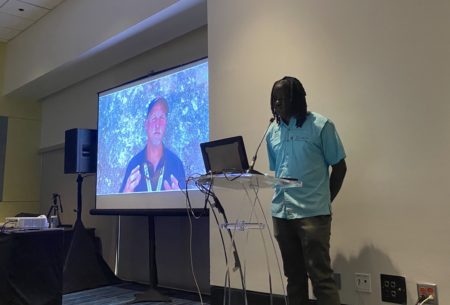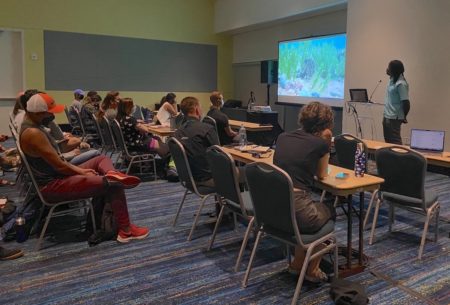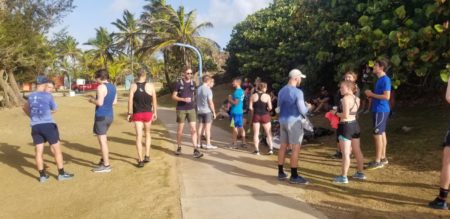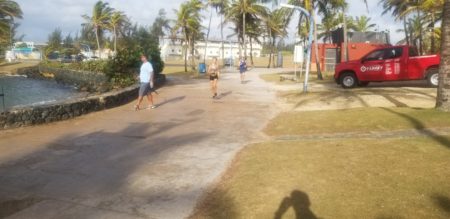When the world seemed to stop at the behest of the pandemic, forcing most of us to remain at home, our BirdsCaribbean community kept going — birding, monitoring, and sharing our stories from safe spaces in our neighborhoods, community parks, and backyards.
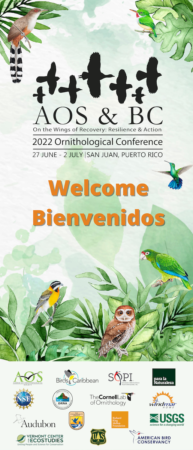 Nearly three years and countless virtual meetings later, the anticipation of an in-person reunion was palpable. In partnership with the American Ornithological Society (AOS), and with invaluable support from local partners Para La Naturaleza and Sociedad Ornitológica Puertorriqueña, Inc. (SOPI), we successfully hosted our biggest conference to date — AOS & BC 2022 — welcoming over 800 wildlife professionals from 34 countries to the tropical shores of Puerto Rico from June 27-July 2, 2022.
Nearly three years and countless virtual meetings later, the anticipation of an in-person reunion was palpable. In partnership with the American Ornithological Society (AOS), and with invaluable support from local partners Para La Naturaleza and Sociedad Ornitológica Puertorriqueña, Inc. (SOPI), we successfully hosted our biggest conference to date — AOS & BC 2022 — welcoming over 800 wildlife professionals from 34 countries to the tropical shores of Puerto Rico from June 27-July 2, 2022.
The conference, held under the theme “On the Wings of Recovery: Resilience and Action”, was a true celebration of the perseverance of our community featuring 146 poster presentations, 143 oral presentations across 14 symposia, 280 contributed papers, 8 roundtable discussions, and 93 student presentations.
Keynote speakers Dr. Howard P. Nelson, professor and wildlife biologist from Trinidad and Tobago and professor of conservation leadership at Fauna & Flora International, and Dr. Herbert Raffaele, retired chief of the U.S. Fish and Wildlife Service’s Division of International Conservation, spoke to the importance of resilience and action as the Caribbean region faces the conservation challenges of the future. Speaking to packed auditoriums at the Convention Center in San Juan, Dr. Nelson addressed “Island Futures: Pathways to Resilient Conservation of Caribbean Birds,” and Dr. Raffaele outlined “Saving Our World’s Birds: A Plan for the Future.”
Plenary speaker, Dr. Kristen Camille Ruegg gave a fascinating talk on: “The Bird Genoscape Project — Unlocking the Secrets of Bird Migration Using DNA in the Tip of a Feather.” And Dr. Purnima Devi Barman received a standing ovation for her inspiring presentation to save the Greater Adjutant Stork, locally known as the Hargila: “The Rewilding Revolution: Using the Magic of Community Action to Save the Hargila,.
“Our international conferences are always special because they give members of our diverse community a chance to meet, network, and learn about cutting-edge research and conservation solutions,” commented Executive Director, Dr. Lisa Sorenson. “This year was exceptional because the pandemic added a new layer of complexity to our work and our plans for the future. Partnering with the AOS allowed us a unique opportunity to widen our network of enthusiastic conservationists. The high level of participation and engagement over these five days of learning in Puerto Rico augurs well for the future of the Caribbean region and the safeguarding of its natural resources, particularly its birds and their habitats.”
BirdsCaribbean Highlights at the Conference
Workshops
- BirdSleuth Caribbean: Connecting Youth to Nature and Science through Birds
Birds are an engaging and fun way to get youth interested in nature, science, and inquiry-based learning. The BirdSleuth Caribbean Workshop sought to inspire participants to consider ways they, and their organizations, might support teachers and youth through educational programs in school as well as in camps and afterschool programs. Facilitated by Jennifer Fee, Cornell Lab of Ornithology, and Dr. Lisa Sorenson, BirdsCaribbean, the full-day workshop reviewed the innovative BirdSleuth Caribbean curriculum — a resource that engages kids in scientific study through fun activities, games, and real data collection through the eBird citizen-science project.
- Raptors of the Caribbean: Education and Conservation Resources
This highly-anticipated workshop focused on teaching participants about raptors, one of the most threatened bird groups in the world. Globally, we recognize there to be a basic lack of knowledge about raptors, as well as a lot of misinformation about birds of prey in general. Although raptors in the Caribbean are suffering population declines, they often remain excluded from environmental education guides and outreach programs.
Through the use of a brand new, hot-off-the-press resource, Environmental Education Guide: Raptors of the Caribbean, workshop facilitators Marta Curti and Gabriela Diaz from The Peregrine Fund engaged participants in dynamic, hands-on activities, and group work to better understand the importance raptors play in the ecosystems where they live. These activities helped participants gain practice and increase their confidence in teaching others about birds of prey using/adapting the materials and activities presented in the education guide.
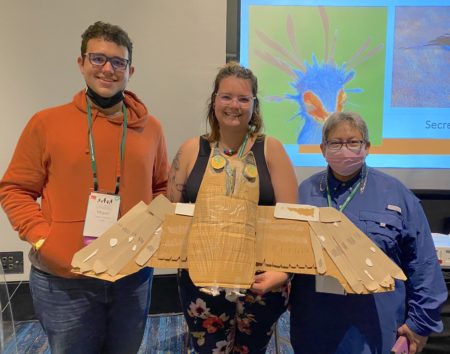
- The Power of Film and Video to Drive Conservation Impact
In the age of social media, and faced with the phenomenon of rapidly declining attention spans, the importance of video as a tool for storytelling cannot be underestimated. New research shows that 83% of people prefer watching videos as a means to learn vs. reading text. In this workshop, Elijah Sands, Senior Communications Officer at the Bahamas National Trust, with support from Tahira Carter, Communications Manager at BirdsCaribbean, engaged participants on the use of the most dynamic form of digital communication — video — to inspire change and drive impact.
- Caribbean Landbird Monitoring Training Workshop
This workshop was held as part of BirdsCaribbean’s Landbird Monitoring Project, which seeks to inspire and facilitate landbird monitoring and conservation efforts in the Caribbean — including raising public awareness, alleviating threats, and managing and restoring habitats. Through a blend of classroom and field-based activities, workshop facilitators Jeff Gerbracht (Cornell Lab of Ornithology), Maya Wilson (BirdsCaribbean), Ingrid Molina (Our Coffee Our Birds), Holly Garrod (BirdsCaribbean), Coral Aviles (San Juan Bay Estuary Program), and Alcides Morales and Omar Monzon (Para La Naturaleza) introduced participants to landbird identification, monitoring techniques, and eBird data entry. The group practiced bird ID and counting techniques at Hacienda La Esperanza Nature Reserve and Cambalache State Forest. Participants will join a regional network of people involved in standardized monitoring and conservation of landbirds in the Caribbean.
Symposia
- Puerto Rico Day: Bird Diversity and Conservation in the “Island of Enchantment”
As traditionally done by BirdsCaribbean, the first day of the conference launched with presentations of local ornithological work. This symposium consisted of two sessions with 11 presentations that included research, conservation, and education conducted by biologists representing different agencies and organizations. In the opening talk, Adrianne Tossas summarized the status and distribution of the avifauna throughout the island, emphasizing threats and current advances in habitat and species protection. Team efforts by the PR Department of Natural and Environmental Resources (PR DNER) and US Fish and Wildlife to save the charismatic and Endangered Puerto Rican Parrot were presented by Tanya Martínez and Thomas White, respectively. Also from PR DNER, Katsí Ramos spoke about the accomplishments of the Endangered Yellow-shouldered Blackbird Recovery Program, and Ingrid Flores focused on the agency’s numerous activities to increase local awareness on biodiversity conservation.
Joseph Wunderle from the USDA Forest Service, gave an overview of the increasing challenges bird populations face from climate change, as revealed from population responses to severe hurricanes across the region in recent years. University of Mississippi biologist, Francisco Vilella, summarized his contribution to the knowledge of the biology of the Puerto Rico Nightjar and raptor species. Marconi Campos, Rainforest Connection, shared recent collaborative work in bird conservation with technological advances that allow remote acoustic sampling of birds in over 600 sites in the island. Hana Weaver gave an update on The Peregrine Fund’s efforts to improve the reproductive rates of the Endangered Puerto Rican Sharp-shinned Hawk, while Laura Fidalgo talked about the contribution of members in bird monitoring programs of the Sociedad Ornitológica Puertorriqueña. Finally, Omar Monzón, from Para La Naturaleza, emphasized on the organization’s role in the protection of private lands and the engagement of volunteers in citizen science.
- Shorebirds of the Atlantic Flyway: How Recent Work to Conserve Wetlands is Contributing to Species and Habitat Resilience in the Caribbean and Beyond
With 15 fantastic talks across three sessions this symposium moved from highlighting the importance of Caribbean and Atlantic Fly wetlands for migrating shorebirds, to the threats shorebirds and wetlands face, and on to the exciting outreach and restoration work. Presenters from 13 different countries shared their recent work and experiences. During the symposium, participants heard how the Caribbean Waterbird Census can highlight where the important places for shorebirds are and the threats they face; data from 12 years of the CWC were presented. We also learned about development that is having devastating impacts on Caribbean wetlands and mangroves, and ongoing battles to halt the destruction. But there were also inspiring stories of hope and community engagement, showing how outreach and education can inspire people to love shorebirds and value their wetlands. Even when all seems lost we learned that wetlands can be restored and created to provide havens for shorebirds, other wildlife and people to enjoy. It was clear that shorebird and wetland conservation in the Caribbean and throughout the Atlantic Flyway is full of challenges. However, working together with local communities we can help protect these beautiful birds and their valuable habitats.
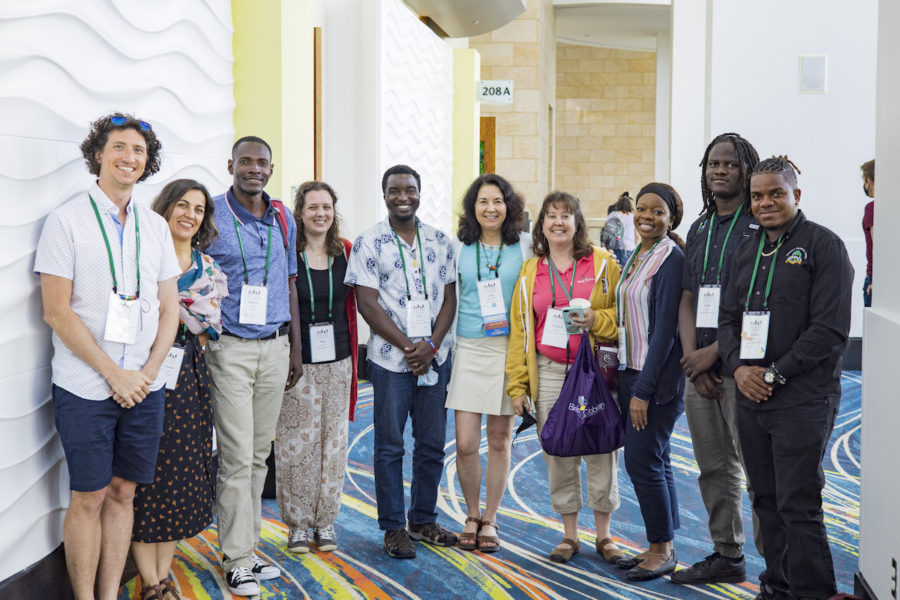
- Planning for Resiliency of Caribbean Island Endemics – Strategies for Post-2020 recovery
This symposium included two sessions with fantastic talks from 11 speakers covering the conservation perspectives on island endemics from across the Caribbean islands from The Bahamas, Puerto Rico, Hispaniola, the Cayman Islands, and Jamaica in the north to Saint Lucia and Trinidad in the south. The symposium provided an opportunity for conservation practitioners to reflect on the status of the endemics on their islands, share insights on recovery patterns after disturbance, and reflect on the implications of the current post-2020 discussions at the Convention on Biological Diversity for the conservation of birds on their islands. Clear themes from these two sessions included the need for realistic targets, much greater financial and technical support for species management interventions, and sustained efforts on practices that are having an impact.
- Seabirds in Peril: How Recent Knowledge is Contributing to Conservation Priorities and Species Resilience in the Face of Environmental Change
Organized by BirdsCaribbean’s Seabird Working Group, the seabird symposium included 14 presentations spread out throughout the whole day. Speakers presented exciting studies from North America to Antarctica, by way of the Caribbean. The day started with a heartfelt call for active restoration of imperiled seabirds globally. Following speakers shared tools to better assess the health of seabird populations, from survey methods using drones (in Puerto Rico) to cutting-edge artificial intelligence to analyze drone and airplane imagery, and from tracking studies of Caribbean seabirds to studies of links between oceanographic features, forage fish and seabirds in the western North Atlantic. participants closely listened when speakers shared about the importance of long-term studies on land (in Jamaica and Antarctica) and at sea (in Gulf Stream waters off the U.S. coast) to assess changes in seabird populations. Finally, conservationists shared inspiring conservation projects, from assessing the presence of predators in the Grenadines to addressing issues of plastic pollution in the Gulf of Maine, and about restoration success stories in Anguilla and Puerto Rico.
The Caribbean Seabird Working Group (with members representing Puerto Rico, Jamaica, the Dominican Republic, the U.S. and British Virgin Islands, Anguilla, Montserrat, the Grenadines, Bonaire, and Curaçao) was able to use gaps in the schedule to discuss its push for a region-wide Seabird Census in 2023.
Working Group Meetings
- Endemics and Threatened Species Working Group (ETSWG)
The BirdsCaribbean ETSWG meeting was attended by 15 members. The meeting reviewed the outcomes of the needs assessment survey prepared by the 2 co-chairs (Ellie Devenish-Nelson & Howard Nelson). Members were also briefed on the status of the Alliance for Zero Extinction by the participants from the American Bird Conservancy (Amy Upgren, Dan Lebbin, Dave Ewert). The participants also discussed key issues for the group including broadening participation across the islands in the working group, data management, funding, and key projects that the various members were working on including monitoring efforts on endemic and threatened species in their countries. The group reviewed the chairmanship and there was unanimity that the current co-chairs would continue to chair the group until the next BirdsCaribbean conference. The Chairs also discussed the development of group activities in the intervening year, and agreed to improve its presence on the BC website and the frequency of members contribution to a working group blog.
- Bird Education & Festivals Working Group and Educators’ Awards
Caribbean Bird Educators reconnected and discussed the themes and activities for this year’s World Migratory Bird Day and Caribbean Endemic Bird Festival. WMBD Coordinators, Laura Baboolal and Miguel Matta, gave a brief overview and handed out Happy Kits to all educators—a wonderful set of materials to educate about this year’s theme—Dim the Lights for Birds at Night. Participants also received a fabulous set of nine different sticker sheets featuring the artwork of talented artist, Josmar Esteban Marquez. The stickers include a variety of Caribbean birds (endemics, residents, waterbirds, shorebirds, migrants, etc.) to use in the next Caribbean Endemic Bird Festival and other bird education activities. Thanks to Daniel Serva for his incredible efforts to carry two heavy suitcases on a long journey from Venezuela to Puerto Rico – he shared the incredible tale of his journey that included a harrowing 6 hour interrogation by US Customs when he arrived in San Juan, who were convinced that Daniel was transporting drugs on the stickers!
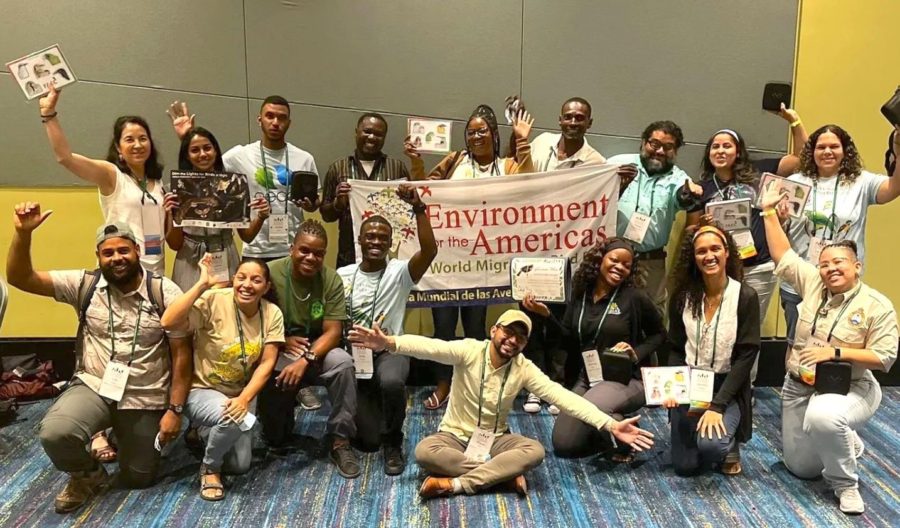
A highlight of the meeting were the awards given to ten different educators who did a fantastic job celebrating WMBD and/or CEBF in the last two years, consistently organizing creative and fun activities for youth and local communities, and also sending in their reports and photos. All recipients received binoculars and a certificate of recognition. Educators’ Awards went to Shanna Challenger (Environmental Awareness Group, Antigua and Barbuda), Maria Paulino (Grupo Acción Ecológica, Dominican Republic), Josmar Esteban Márquez (AveZona) Inés Lourdes Fernández (La Empresa Flora y Fauna Santiago, Cuba), Ingrid Flores (DRNA, Puerto Rico), Carla Montalvo (Roots and Shoots, Puerto Rico), Ajhermae White (Dept of Environment, Montserrat), Monika Gomez (DR), Natalya Lawrence (Antigua and Barbuda), Shirley Droz (post-humous award, Puerto Rico), and Marisa Awai (Bahamas). Congratulations to all the winners!
Roundtables
- Action Learning for Building Resiliency in Island Endemic Species Recovery
The roundtable on species recovery used an action learning approach to deliver on a specific need identified by the Endemics and Threatened Species Working Group’s needs assessment survey – more training on species recovery. The session consisted of two segments, the first enabled the 20 participants to learn from three guest speakers from The Bahamas, the Dominican Republic, and Antigua and Barbuda, who shared their experiences undertaking species recovery actions on their islands. The second part of the round-table permitted all participants to interact directly with the speakers and each other in small working groups, which enabled workshopping the challenges each participant was experiencing with species recovery on their respective islands. Feedback from the participants suggested that the workshop provided an excellent forum for learning from each other’s professional experiences as well as improving the informal networks between species recovery practitioners.
- The Journal of Caribbean Ornithology (JCO) at 34—an Open Discussion on How our Regional Journal can Best Meet your Needs
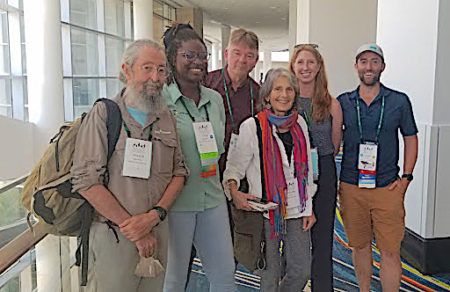
The JCO–BirdsCaribbean’s peer reviewed scientific journal–welcomed fellow editors, authors, and other conference participants for a brainstorming session about the role of our journal in the Caribbean research and conservation communities. Managing Editor Dr. Stefan Gleissberg opened up the discussion with an overview, and Editor-in-Chief Dr. Joe Wunderle was available throughout to answer questions. JCO occupies a rather unique niche serving a biodiverse region which at the same time is also culturally and politically diverse. To limit access barriers to critical information on Caribbean birds, JCO publishes in three languages, provides immediate open access, keeps a comprehensive online archive, and has only modest publication charges. A vital point of the journal’s work is to assist early-career and first-time authors, and those who’s research is not conducted with the support system of an academic institution, in order to achieve the highest-possible impact of their work. Roundtable participants contributed valuable ideas. Conversation points included ethical and permit compliance, and how these vary widely among islands and territories. Following a request by a participant, JCO now explores how abstracts from the conference can be published in the journal, increasing visibility.
https://youtu.be/OGh68PB88Dk
BirdsCaribbean Awards
As is customary, on the final night of the conference, we celebrated the individuals and groups that went above and beyond in their service to our shared cause of conservation and protection for Caribbean birds. This year, we had the honor to present awards to 12 exceptional individuals.
The most prestigious award — The Lifetime Achievement Award — went to two conservation stalwarts (1) Dr. John Faaborg, Emeritus Professor, University of Missouri and (2) Mr. Eric Carey, Executive Director, Bahamas National Trust and Past President of BirdsCaribbean. This award honors individuals who have helped change the future of Caribbean birds and their habitats for the better through a lifetime of work and dedication.
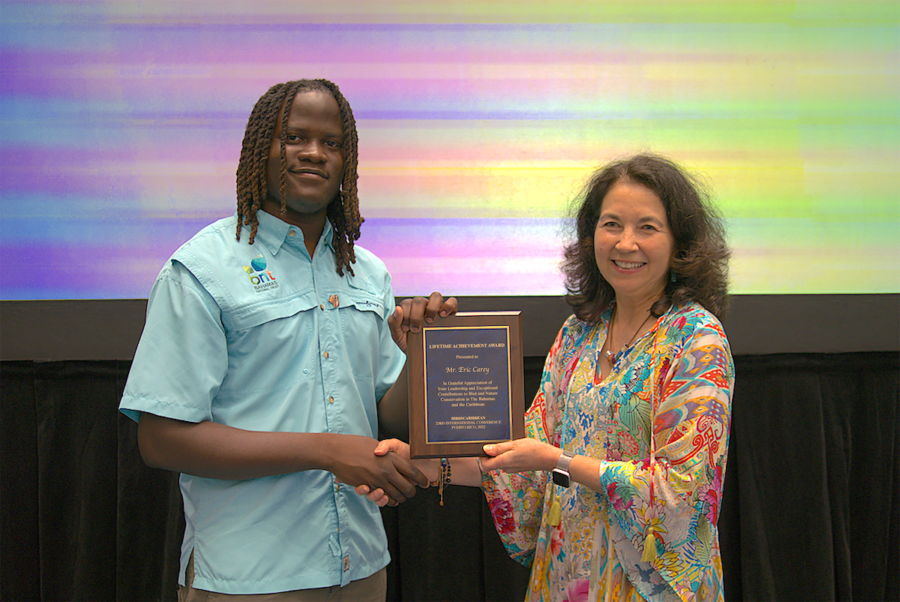
Eight individuals, representing three organizations – U.S. Fish and Wildlife Service’s Puerto Rican Parrot Recovery Program, Terrestrial Ecology Division, Puerto Rico’s Department of Natural and Environmental Resources; and Sociedad Ornitológica Puertorriqueña, Inc. (SOPI) – were hand selected by our President Dr Adrianne Tossas for the President’s Award. In choosing recipients several things are considered, particularly their ability to adapt in challenging times and master their skills ultimately raising the bar of service in conservation. This year’s Founders’ Award recipient was Julissa Irizarry from Puerto Rico, for her outstanding paper entitled Evaluating avian biodiversity in Puerto Rico’s urban neighborhoods: A test of the “luxury effect”. And finally Russell Campbell received the Video Workshop Award for showing the most initiative in the field following the training session at the conference. Read all the details and award citations here.

Silent Auction
The Silent Auction is an important fundraising activity and always a fun event at BirdsCaribbean conferences. Among the many items donated by our members for auction this year was the once-in-a-lifetime experience to zipline with BirdsCaribbean Executive Director Dr Lisa Sorenson! It is worth mentioning that Lisa wasn’t even aware this item was up for bid until too late, but seized the moment and fulfilled her ziplining duties in great form for the birds! A huge thank you to our members who donated a record-breaking 600 items for auction this year, helping us to raise US$6,000! All proceeds from the auction support our ongoing conservation efforts and provide much-needed travel scholarships to help Caribbean wildlife students and professionals attend our meetings.
Tody Trot
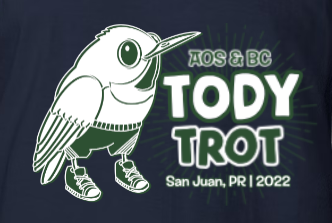 This year’s 5k Fun Run, the Tody Trot, was named in honor of one of Puerto Rico’s most fascinating endemic bird species, the Puerto Rican Tody. 5k organizers, Maggie MacPherson and Justin Proctor, were excited to welcome 75 runners and walkers to the starting line. The course took participants along sandy beaches, beautiful ocean views, and even a castle, finishing in style on a rocky peninsula with waves crashing all around.
This year’s 5k Fun Run, the Tody Trot, was named in honor of one of Puerto Rico’s most fascinating endemic bird species, the Puerto Rican Tody. 5k organizers, Maggie MacPherson and Justin Proctor, were excited to welcome 75 runners and walkers to the starting line. The course took participants along sandy beaches, beautiful ocean views, and even a castle, finishing in style on a rocky peninsula with waves crashing all around.
Merchandise
This year, we partnered with award-winning biological illustrator, Arnaldo Toledo, and past president of Sociedad Ornitológica Puertorriqueña Inc. and Tour Operator for Wildside Nature Tours, Gabriel Lugo, to create a series of eye-catching designs! Arnaldo and Gabriel combined art, birds, and fashion to bring attention to Puerto Rico’s iconic bird species and the threats they face. The AOS-BC Conference collection included t-shirts, hats, buffs, stickers, and a poster that all featured the gorgeous illustrations of talented Cuban artist Arnaldo Toledo. These items and many others, such as local bird-friendly coffee and field guides from Puerto Rico and the West Indies, make great souvenirs from the conference and unique gifts for family and friends! Limited merchandise items from the conference are still available for purchase in Puerto Rico, please contact the Sociedad Ornitológica Puertorriqueña Inc. for more information (Gabriel Lugo and Emilio Font)
Raffle
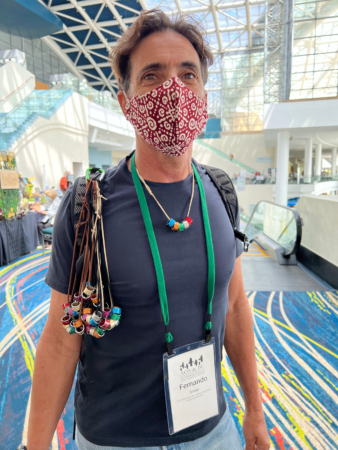
Thanks to our generous partners, we are hosting another amazing Raffle to support our ongoing conservation efforts. All proceeds directly impact scientific research and support programs and activities that build the capacity of Caribbean wildlife professionals — like our regional training workshops and conferences. The items offered this year are so good that we have two grand prizes — an original watercolor “Puerto Rican Tody” by award-winning Cuban Wildlife Artist and Illustrator, Arnaldo Toledo; and the Vortex Razor HD 8×42 Binocular, valued at US$1,279.99!
Other fabulous prizes include more stunning bird art — limited edition, high-quality giclee prints of Cuban endemic birds, signed and numbered by acclaimed Cuban artist and author, Nils Navarro. The grand prize drawing will take place on Saturday, 27 August 2022 so enter now for a chance to win! bit.ly/Raffle-2022 With each ticket purchase, you can help Caribbean nationals create better tomorrows for the birds and the communities that live alongside them. 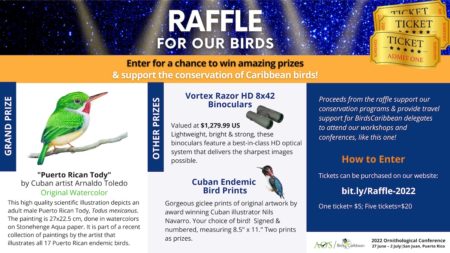
Exploring Puerto Rico: Excursions and Endemics
We could not come to Puerto Rico, home to some of the region’s most stunning endemic birds, and not explore the beauty of our host island. Local hosts, Para La Naturaleza and SOPI ensured that conference attendees had the opportunity to discover as much of Puerto Rico’s rich flora and fauna as possible. Tours included visits to El Yunque National Forest in Río Grande, Medio Mundo y Daguao in Ceiba, the Cabezas de San Juan Nature Reserve in Fajardo, the Antiguo Acueducto del Río Piedras and the Parque Central de San Juan.
Acknowledgements
A huge thank you to everyone that helped make this conference a tremendous success! It was a pleasure to work with our co-host, the American Ornithological Society, and our local partners, Para la Naturaleza and Sociedad Ornitológica Puertorriqueña to organize the conference. We are very grateful to all the conference sponsors and donors, including the National Science Foundation, Dept of Natural Resources and Environment, Puerto Rico, the Cornell Lab of Ornithology, Windmar Home, Audubon, US Fish and Wildlife Service, Para la Naturaleza, Richard King Mellon Foundation, US Geological Survey, American Bird Conservancy, Vermont Center for Ecostudies, and the US Forest Service – we could not have held this conference without you! We are especially grateful to all those that provided funding and donated to help us provide travel scholarships to 40 Caribbean wildlife professionals and students, including those that participated and donated to our 2022 Global Big Day teams fundraising event in May. As you can see in the photos and videos, the conference provided an incredible opportunity for learning and networking. It also helped us to reconnect, recharge, and become newly inspired to continue our vital conservation work, after a long period of covid isolation. Thank you to all of you from the bottom of our hearts!!!
Gallery
Hover over each photo in the gallery to see the caption or click on a photo to view as a slide show.






